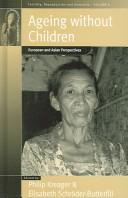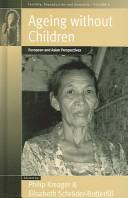| Listing 1 - 3 of 3 |
Sort by
|

ISBN: 1845450418 1571816143 1789205794 Year: 2004 Publisher: New York, N.Y. Berhahn
Abstract | Keywords | Export | Availability | Bookmark
 Loading...
Loading...Choose an application
- Reference Manager
- EndNote
- RefWorks (Direct export to RefWorks)
Rapid fertility declines and improved longevity are now shifting the overall balance of population towards older ages in many parts of the world. Within this growing population of older people there are many groups with particular needs about which relatively little is known. This collection focuses on one such sub-population, the elderly without children. Few would deny that childlessness poses potential human and welfare problems for older people without them. What is less well known is that comparative anthropological and historical demographic research indicates that childlessness is a recurring social phenomenon that has affected 1 in 5 older women in many cultures and historical periods. High levels of childlessness arise not solely or primarily from biological factors like primary sterility, but from a combination of actors. Many, like non-marriage, delayed childbearing , and pathological sterility, reflect the interaction of social and biological influences. Also of major importance are factors that remove the support of children from elders' lives: migration, mortality, divorce, remarriage, family enmity, social mobility, and the pressing demands of family and career on younger generations. The papers collected in this volume employ a mixture of quantitative and qualitative methods to define and characterize the experience of ageing without children.
Sociology of the family. Sociology of sexuality --- Asia --- Europe --- Childlessness --- Older people --- Services for

ISBN: 9781571816146 Year: 2004 Publisher: New York (N.Y.) Berghahn
Abstract | Keywords | Export | Availability | Bookmark
 Loading...
Loading...Choose an application
- Reference Manager
- EndNote
- RefWorks (Direct export to RefWorks)
Digital

ISBN: 9789814517980 9789814517973 Year: 2014 Publisher: Singapore ISEAS Publishing
Abstract | Keywords | Export | Availability | Bookmark
 Loading...
Loading...Choose an application
- Reference Manager
- EndNote
- RefWorks (Direct export to RefWorks)
| Listing 1 - 3 of 3 |
Sort by
|

 Search
Search Feedback
Feedback About UniCat
About UniCat  Help
Help News
News